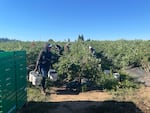New rules to protect workers laboring in excessive heat were enacted on Thursday, but some groups worry they won’t be enforced rigorously enough to prevent future deaths.
Gov. Kate Brown directed the Oregon Occupational Safety and Health Administration to enact temporary rules, which include ensuring workers’ access to shade and cool drinking water when temperatures reach or exceed 80 degrees Fahrenheit. When temperatures rise above 90 degrees Fahrenheit, employers must also provide extra breaks or a cool-down period.
This response to calls for emergency rules to protect workers laboring outdoors followed a farmworker’s death on a farm north of Salem on June 26. Sebastian Francisco Perez, 38, was moving irrigation lines on Ernst Nursery & Farms in St. Paul.
Related: Series of vigils held for 38-year-old farmworker who died during the heat wave
In a press release statement, advocacy groups PCUN, Renew Oregon, Northwest Justice Workers Project, and Oregon Environmental Council said they will continue to inform workers of their workplace rights and push for permanent protections.

Oregon farmworker union rep. April Alvarez told the crowd something needs to be done about Perez's death during a vigil held in Portland, July 3, 2021, in memory of Sebastian Francisco Perez, a 38-year-old farm worker who died in this week's heat wave that brought temperatures above 115 in the Willamette Valley. “We are asking OSHA to provide access to clean and fresh water for our farmworkers. To provide areas with actual shade for our farm workers to rest. To actually have paid breaks, especially when the heat is exceeding 90 degrees.”
Kristian Foden-Vencil / OPB
“It’s crucial that we continue to take steps towards long-term policy shifts in our state, that take climate change, and workers safety seriously,” PCUN Executive Director Reyna Lopez said. “That means creating standards that keep people safe, while engaging stakeholders in climate policy that will allow our communities to be healthy, and thrive in the long term.”
Oregon Farm Bureau Policy Counsel Samantha Bayer said many farmers already implement safety measures like access to shade, water and extra breaks on their farms. She said the Oregon Farm Bureau supports the temporary rules but implementating some during the middle of the harvest season will be challenging for some farmers.
“Farmers have to keep track of so much,” Bayer said. “And then to go and learn new rules that are pages and pages of legalese and then not only learn them and apply them on their own farm but then effectively communicate those with their employees when there’s language barriers is really challenging.”
Related: Oregon enacts rules to protect workers as heat wave death toll continues to rise
According to the rules, supervisors and employees must complete training for employees to recognize common signs of heat-related illnesses, understand personal risk factors from working in excessive heat, and to adopt safe methods of work in a hot environment.
Bayer said she hopes Oregon OSHA will step in and help employers with training materials and translation services in a timely way. She said farmers also will need consultation services and technical assistance as the new the rules are coming on line midway through the harvest season.
“In my opinion, shared understanding between employers and employees and the state, is the absolute key ingredient for workplace safety,” Bayer said.
Attorney for Northwest Workers Justice Project, Kate Suisman, said Oregon OSHA has put out good emergency rules but agrees that the timing for the rules is too late. She wants Oregon OSHA to strongly enforce these rules to make sure there are no more on-the-job, heat-related deaths.
Related: Laboring through Oregon’s hottest days underscores the push for worker protections
“Without strong enforcement, there’s really not a lot of incentive for those low-road employers to do the right thing and OSHA needs to have a bigger stick,” Suisman said. “They need to use that penalty power to show people that it costs money if you’re going to put workers’ lives at risk.”

Farmworkers preparing the blueberries they picked in a farm in Albany to get them weighed and ready to ship to a pack house on June 28, 2021.
Monica Samayoa / OPB
Suisman said Oregon OSHA should increase penalties and fines so employers do not repeatedly violate the rules. Brother Farm Labor Contractor, the employer who hired Perez, had previous Oregon OSHA violations. Most recently exposing workers to unsanitary conditions and not providing drinking water and handwashing facilities.
“You can have the greatest rules on paper and we’re fighting for these strong protections, but if employers know that the penalty is a warning letter, what’s that going to do?” she said.
Oregon OSHA’s Aaron Corvin said the agency’s approach to enforcement is designed to encourage compliance and they focus on modest penalties for most violations with higher penalties for repeated and willful violations.
The temporary rules will stay in place for 180 days as Oregon OSHA will continue to work on permanent rules for excessive heat and wildfire smoke.


